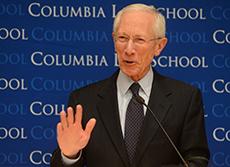Stanley Fischer, Former Governor of the Bank of Israel, Addresses Columbia Law School
Renowned Economist Who Led Israel's Central Bank for Eight Years Delivers the 2013 Harold Leventhal Memorial Lecture
New York, December 5, 2013—Makers of monetary policy must balance the dangerous power to print money with the creativity and flexibility to confront unexpected challenges, said Stanley Fischer, former governor of the Bank of Israel, in Nov. 21 remarks at Columbia Law School.
| Stanley Fischer |
Fischer, who led Israel’s central bank for eight years after serving in senior capacities at Citigroup and the International Monetary Fund (IMF), came to campus to deliver the 2013 Harold Leventhal Memorial Lecture. Dean David M. Schizer, Lucy G. Moses Professor of Law and Harvey R. Miller Professor of Law and Economics, introduced him.
“Stan Fischer does not need an introduction but he deserves one anyway,” Schizer said, outlining Fischer’s distinguished career in academia, public service, and the private sector.
Fischer began his presentation explaining that he first became involved with Israel’s monetary policy as a consultant in the 1980s while a professor at MIT. In part to finance immense investments in defense, the Israeli government had come to rely on the central bank to print money, undermining the larger economy. Fischer helped craft Israel’s economic stabilization program, recommending that the central bank have more independence so it could refuse to finance the government’s deficit. Israel ultimately balanced its budget shortly thereafter.
“Israel has had a very robust economy since it was stabilized,” Fischer said. “Few economies can go through as many wars as Israel has been through. It’s been an extraordinary success story.”
| Dean David M. Schizer |
At the invitation of Benjamin Netanyahu, the finance minister under Prime Minister Ariel Sharon, Fischer became head of the Bank of Israel in 2005 and helped guide the Israeli economy through a tumultuous period including the global financial crisis of 2008. Fischer said central bankers must act decisively, even though the information they rely on is often months out of date and printing too much money can cause inflation.
“A central bank is a very dangerous institution since it can print currency in unlimited quantities,” Fischer said. “Central banking is something like a pointillist painting—you have all these dots of data and you’re trying to figure out what on earth is the picture.”
Fischer argued that the next generation of economic leaders should prepare for more crises in the future, many of them unforeseen.
“You will not see the next crisis coming, but be prepared for a crisis so you have machinery in place,” Fischer said. “In a crisis, show no signs of panic. Experience makes you calmer, and you need a little bit of luck.”
Fischer’s talk was sponsored by the Center for Israeli Legal Studies at Columbia Law School, directed by Zohar Goshen, the Alfred W. Bressler Professor of Law, and Columbia Economics’ Program for Economic Research.

